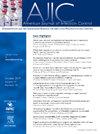Health care workers’ perceptions about infection prevention and control in Latin America
IF 3.8
3区 医学
Q2 INFECTIOUS DISEASES
引用次数: 0
Abstract
Background
Limited information exists regarding health care workers’ (HCWs) perceptions about infection prevention and control (IPC) in Latin America.
Methods
We conducted an electronic voluntary anonymous survey to assess HCWs’ perceptions toward IPC in 30 hospitals in Latin America during August to September 2022. Nurses, physicians, and environmental cleaning (EVC) staff were prioritized for recruitment.
Results
Overall, 1,340 HCWs completed the survey. Of these, 28% were physicians, 49% nurses, 8% EVC staff, and 15% had “other” roles. Self-compliance with hand hygiene and prevention bundles was perceived to be high by 95% and 89% of respondents, respectively; however, ratings were lower when asked about compliance by their peers (reported as high by 81% and 75%, respectively). Regular training on IPC and access to health care-associated infections (HAI) rates were more limited among physicians than other HCWs (eg, 87% of EVC staff and 45% of physicians reported training upon hiring and thereafter, 60% of nurses and 51% of physicians reported regular access to HAI rate reports).
Conclusions
We identified several opportunities to strengthen IPC practices in Latin American hospitals, including improving HCW education and training on IPC and their awareness of HAI rates and compliance with prevention measures.
拉丁美洲医护人员对感染预防和控制的看法。
背景:在拉丁美洲,有关医护人员对感染预防和控制(IPC)看法的信息十分有限:有关拉丁美洲医护人员(HCWs)对感染预防与控制(IPC)看法的信息有限:2022 年 8 月至 9 月期间,我们在拉丁美洲的 30 家医院开展了一项电子自愿匿名调查,以评估医护人员对 IPC 的看法。护士、医生和环境清洁(EVC)人员是优先招募对象:共有 1,340 名医护人员完成了调查。其中,28%为医生,49%为护士,8%为环境清洁(EVC)人员,15%为 "其他 "角色。分别有 95% 和 89% 的受访者认为自己对手卫生 (HH) 和预防捆绑包的依从性较高;但当问及同行的依从性时,受访者的评分较低(分别有 81% 和 75% 的受访者认为自己的依从性较高)。与其他医护人员相比,医生在定期接受 IPC 培训和了解医护相关感染率 (HAI) 方面受到的限制较多(例如,87% 的 EVC 人员和 45% 的医生表示在受聘时接受过培训,此后,60% 的护士和 51% 的医生表示定期了解 HAI 感染率报告):我们发现了拉美医院加强 IPC 实践的几个机会,包括改善医护人员在 IPC 方面的教育和培训,提高他们对 HAI 感染率的认识以及对预防措施的遵守。
本文章由计算机程序翻译,如有差异,请以英文原文为准。
求助全文
约1分钟内获得全文
求助全文
来源期刊
CiteScore
7.40
自引率
4.10%
发文量
479
审稿时长
24 days
期刊介绍:
AJIC covers key topics and issues in infection control and epidemiology. Infection control professionals, including physicians, nurses, and epidemiologists, rely on AJIC for peer-reviewed articles covering clinical topics as well as original research. As the official publication of the Association for Professionals in Infection Control and Epidemiology (APIC)

 求助内容:
求助内容: 应助结果提醒方式:
应助结果提醒方式:


